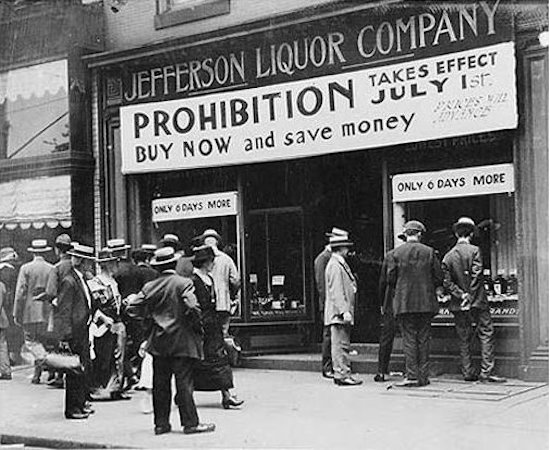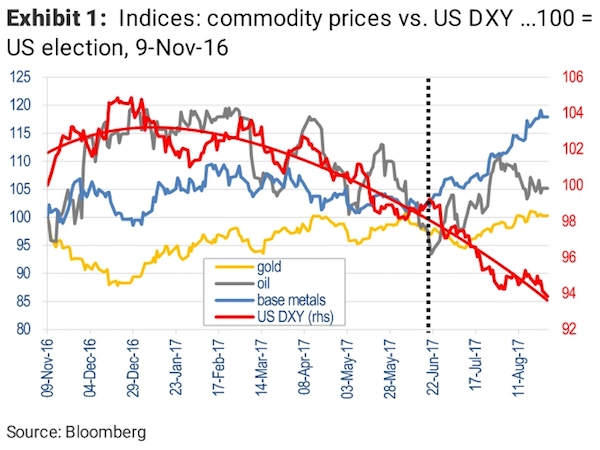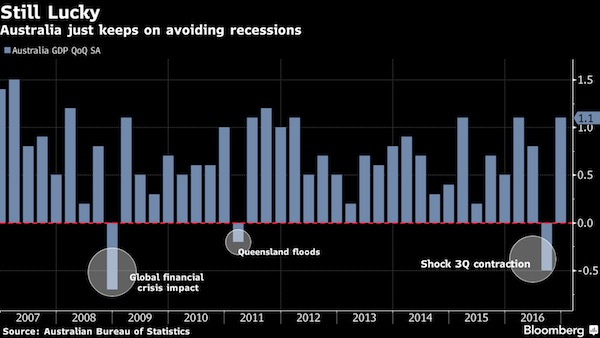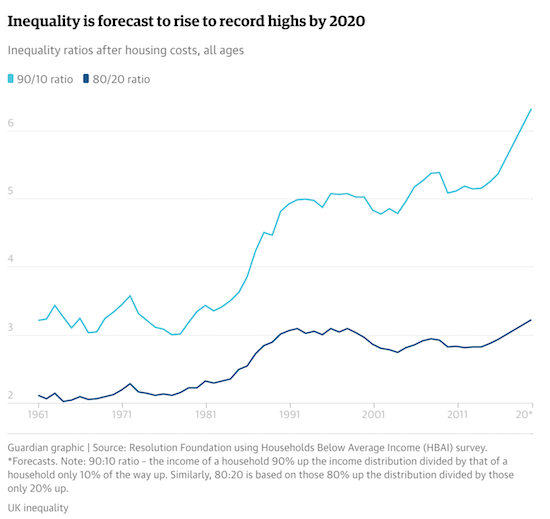
Salvador Dali Nymphs in a romantic garden 1921

How nutritious are those nothingburgers? At some point you get concerned for these peoples’ metabolism.
“Two sources told BuzzFeed that British intelligence found no evidence of Russian meddling in either the 2016 referendum vote or the 2017 general election.”
Russophobia is even stronger in Britain than in the US, so they’ll find a way to twist this, don’t worry.
• UK Spy Agencies Found No Evidence Of Russian Brexit Interference (BF)
The UK’s intelligence agencies have found no evidence that the Russian state interfered in the outcome of the Brexit referendum and the 2017 general election, according to two sources with direct knowledge of the findings in an as-yet-unpublished report from Parliament’s Intelligence and Security Committee. One of the sources told BuzzFeed News the finding was categorical. The report, titled simply “Russia”, is at the centre of a row between some MPs and Downing Street after the committee’s chair, former attorney general Dominic Grieve, urged Boris Johnson to release the report ahead of the Dec. 12 general election, arguing that it was “really unacceptable for the prime minister to sit on it”.
The committee sent the report to Johnson’s office on Oct. 17. It will not be released before the election unless it is cleared for publication by the beginning of next week before Parliament is dissolved for the campaign. Raising a point of order in the House of Commons on Thursday, Grieve expressed regret that the report had not already been cleared for publication by the prime minister. He continued: “We thus have a committee of Parliament waiting to lay before the House a report that comments directly on what has been perceived as a threat to our democratic processes. Parliament and the public ought to and must have access to this report in the light of the forthcoming election, and it is unacceptable for the prime minister to sit on it and deny them that information.”

Nancy finds herself stuck in her impeachment call. She’s smart enough to see how bad a call that was. And she’s old enough that she should never have been in her present role. But you know, power calls. She should be handing over the baton to a younger crowd, but she has no idea what they are thinking, and those are her own words.
Thing is, by her and her ilk not being grandmas and grandpas as they should, they force the young ‘uns into more radical positions just to have any voice at all. And by insisting on staying, she creates the space for self-imploding devices like Adam Schiff to move themselves forward into the limelight they so desperately crave. Spend more time with the family, Nancy, you’re making it too easy for Trump.
• Pelosi Warns 2020 Candidates They’re On The Wrong Track (ZH)
House Speaker Nancy Pelosi thinks Democrats running for president in 2020 might strike out against Trump with ultra-liberal policies that fire up the party’s progressive base, yet might not go over so well with swing voters in flyover states. Proposals pushed by Elizabeth Warren and Bernie Sanders like Medicare for All and a wealth tax play well in liberal enclaves like her own district in San Francisco but won’t sell in the Midwestern states that sent Trump to the White House in 2016, she said. -Bloomberg “What works in San Francisco does not necessarily work in Michigan,”Pelosi said in a wide-ranging interview with Bloomberg. “What works in Michigan works in San Francisco — talking about workers’ rights and sharing prosperity.” “Remember November,” she added. “You must win the Electoral College.”
And while she didn’t back any particular candidate running for office, Pelosi said Democrats should be focusing on “lower costs of prescription drugs, bigger paychecks by building infrastructure, and cleaner government.” She also worries that candidates like Warren and Sanders are going down the wrong track by trying to ‘out-left’ each other to court fellow progressives while abandoning moderate voters that the party needs to win back from Trump. “As a left-wing San Francisco liberal I can say to these people: What are you thinking?” Pelosi said. “You can ask the left — they’re unhappy with me for not being a socialist.” Pelosi also expressed concerns that voters don’t care about the Green New Deal promoted by Bernie Sanders and Elizabeth Warren, which calls for rapid, radical reductions in carbon emissions.
“There’s very strong opposition on the labor side to the Green New Deal because it’s like 10 years, no more fossil fuel. Really?” said Pelosi. “The speaker’s concerns reflect those of many Democratic leaders and donors who believe that left-wing policies will alienate swing voters and lead to defeat. Warren and Sanders are betting on a different theory — that voters who float between parties are less ideological and can be inspired to vote for candidates who represent bold new change in Washington. Pelosi said Democrats should seek to build on President Barack Obama’s Affordable Care Act instead of pushing ahead with the more sweeping Medicare for All plan favored by Warren and Sanders that would create a government-run health care system and abolish private insurance.” -Bloomberg

“All American presidents commit crimes and end up taking the Nobel Prize..”
• Assad Calls Trump “Best US President” Ever For “Transparency” (ZH)
Arguably some of the most significant events since the eight-year long war’s start have played out in Syria with rapid pace over just the last month alone, including Turkey’s military incursion in the north, the US pullback from the border and into Syria’s oil fields, the Kurdish-led SDF’s deal making with Damascus, and the death of ISIS leader Abu Bakr al-Baghdadi. All of this is why a televised interview with President Bashar Assad was highly anticipated at the end of this week. Assad’s commentary on the latest White House policy to “secure the oil” in Syria, for which US troops have already been redeployed to some of the largest oil fields in the Deir Ezzor region, was the biggest pressing question.
The Syrian president’s response was unexpected and is now driving headlines, given what he said directly about Trump, calling him the “best American president” ever – because he’s the “most transparent.” “When it comes to Trump you may ask me a question and I’ll give you an answer which might seem strange. I tell you he’s the best American president,” Assad said, according to a translation provided by NBC. “Why? Not because his policies are good, but because he is the most transparent president,” Assad continued. “All American presidents commit crimes and end up taking the Nobel Prize and appear as a defender of human rights and the ‘unique’ and ‘brilliant’ American or Western principles. But all they are is a group of criminals who only represent the interests of the American lobbies of large corporations in weapons, oil and others,” he added.

Laws broken all around and all the time.
• Britain Ignores Assange Medical Appeal: UN (AAP)
The British government has ignored an urgent medical appeal for imprisoned WikiLeaks founder Julian Assange, a UN expert says. UN rapporteur on torture Nils Melzer says Britain has taken no action since he and medical experts visited Assange at a London prison in May. They found Assange displaying “all the symptoms typical for prolonged exposure to psychological torture”. “However, what we have seen from the UK government is outright contempt for Mr Assange’s rights and integrity,” Melzer said in a statement on Friday. “Despite the medical urgency of my appeal, and the seriousness of the alleged violations, the UK has not undertaken any measures of investigation, prevention and redress required under international law.” Melzer urged Britain on Friday to block the extradition and release Assange.

As long as there’s no IPO, any valuation can be used. But on moral grounds too, this should be boycotted.
• Saudi Arabia Kick-Starts Aramco IPO (R.)
Saudi Arabia kick-started Aramco’s initial public offering (IPO) on Sunday as its market regulator approved the oil giant’s application to list on the domestic bourse and create the world’s most valuable listed firm. A statement from the Capital Market Authority (CMA) did not give a time frame or say how much Aramco would sell, but sources have told Reuters the oil company could offer 1% to 2% of its shares on the local bourse, raising as much $20 billion to $40 billion. Confirmation of the share sale in Saudi Arabian Oil Co., or Aramco, as the oil giant is usually known, comes about seven weeks after crippling attacks on its oil facilities, underlining Saudi Arabia’s determination to push on with the listing regardless.
The IPO of the world’s most profitable company is designed to turbo charge Crown Prince Mohammed bin Salman’s economic reform agenda by raising billions to diversify the kingdom, whose dependency on oil was highlighted by the production impact of the Sept. 14 attacks. [..] Prince Mohammed gave the green light on Friday for the IPO to go ahead, Reuters reported, citing sources. Although he put a $2 trillion valuation on the company in early 2016, bankers and company insiders say Aramco’s value is closer to $1.5 trillion.

Tyler: “..Trump’s non-stop fake trade news tweeting..”
• Global Shipping Container Rates Plunge (ZH)
President Trump’s non-stop fake trade news tweeting has indeed decoupled the market from focusing on worsening macro and fundamentals. Teddy Vallee, CIO of Pervalle Global, has spotted an alarming downtrend in the Freightos 40 ft. Global Shipping Container Rate. Vallee has likely found an accurate barometer of global economic activity, now plunging in the last two months. “The move in container shipping rates is consistent with the continued deterioration in raw industrial commodities, China’s official PMI, China’s steel PMI, as well as market internals such as industrials relative to the S&P500,” Vallee said.
Freightos 40 ft. Global Shipping Container Rate started to trough in 1H19. The narrative back then was the global/US economy would rebound in 4Q19 and soar in 2020. But with 61 days left in 4Q, macroeconomic headwinds continue to mount across the world as global container rates plunge to new lows on the year, suggesting a global/US economic revival is nowhere to be found. With no signs of a global recovery, market participants will once again be jawboned back to reality, or as some have called it: a ‘macro matters’ event — the only question is finding the trigger that brings everybody out of the fake trade news daze spurred by the Trump administration.
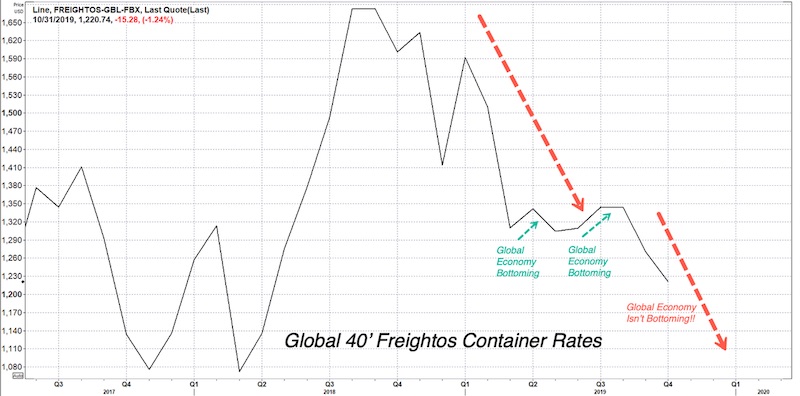

Too many questions about this. What are the building standards they aim to use? And retrofitting 27 million homes will result in only 450,000 jobs, over a decade?
But most of all, when someone says things like “..we face the threat of a hostile and dying planet. But Labour will turn that threat into an opportunity..”, tell them to get lost. We can’t heal the planet for profit. That’s just empty PR.
• Labour Plans To Make 27 Million Homes Energy Efficient (G.)
Labour is claiming to have drawn up plans for the biggest overhaul of housing since the second world war, with a plan to instal loft insulation, double glazing and renewable technologies in almost all of the UK’s 27 million homes. The party says that the Warm Homes for All scheme will create 450,000 jobs over the next decade. Under the plans, low-income households would be able to apply for a grant, paying no upfront costs. They would keep most of the savings on their bills, though part would be used to pay for a proportion of the work. Wealthier households would be able to claim interest-free loans for the work, with the loans claimed back through their bills.
Labour said that, through the scheme, 6.34 million homes would have heat pumps and 5.3 million homes would have solar thermal systems by 2030. The party said the UK’s housing stock was among the worst insulated in Europe, with building electricity and heat use the biggest source of emissions in Britain. The party said the waste was costing households billions of pounds and pushing 3.5 million of them into fuel poverty. However, there are significant costs implied by the scheme. Labour calculates that delivering essential upgrades to the UK’s entire housing stock will cost about £250bn, or an average of £9,300 per house. [..]
Jeremy Corbyn said: “If we don’t radically change course we face the threat of a hostile and dying planet. But Labour will turn that threat into an opportunity. We will tackle the climate crisis by putting wealth in the hands of the many not the few, with lower bills and more good jobs. “By investing on a massive scale, we will usher in a green industrial revolution with good, clean jobs that will transform towns, cities and communities that have been held back and neglected for decades.

Not a terribly strong article at RT, but we must remind people that Green has become a major marketing ploy. Beware.
• Don’t Drive Electric Cars, Ignore Paper Bags & Forget About Organic Food (RT)
Renewable energy, hailed as the answer to the world’s petrochemical dependency, is not the cure-all it is depicted as. Solar power, for example, creates no carbon emissions once the solar panels are up and running, but their manufacture is a toxic mess. Produced with the carcinogenic, mutagenic heavy metal cadmium and requiring billions of liters of water to manufacture and cool, solar cells have their own dark side seldom examined in discussions of the impending shift to renewable energy. Electric cars have become a symbol of environmental progress, with companies that produce them receiving government subsidies in many countries. But more energy is consumed in the production of an electric car than a gas-powered vehicle, and a 2011 study found the carbon footprints of both vehicles to be about the same.
Electric cars may not produce emissions while driving, but they’re only as green as the electricity used to charge them. Worse, the batteries they use are loaded with toxic metals like lithium, copper, and cobalt. Mining these substances devastates the environment, and improper disposal of used batteries can cause them to leak back into nature. Biomass and biofuels certainly sound environmentally friendly – how can you go wrong with “bio” in the name – but it actually generates more carbon emissions than fossil fuels to create the same amount of energy. Substances burnable under the aegis of “biomass” can include anything from timber waste to garbage, meaning it can burn clean or litter the atmosphere with pollutants. And even burning ‘clean’ wood means cutting down trees – hardly environmentally friendly.

South Africa won the rugby World Cup on Saturday. I’m not a rugby fan, but I did see the British crowds in a sports bar from across the street. The story behind it is far more interesting though. 30 years after Mandela, very little has improved.
“It’s easy to talk about going through hard times and struggling to get opportunities, but it’s tough to tell people that there were days when I didn’t have food or shoes to wear..”
• Captain Siya Kolisi Wants To ‘Inspire Every Kid’ In South Africa (BBC)
Kolisi, who grew up up in a poor township of Zwide, just outside Port Elizabeth on the Eastern Cape, flew his father abroad for the first time to watch him represent his country in Japan. He added: “You can never forget where you come from or the people who have helped you get here so I just wanted to celebrate with him [his father]. “Growing up, I never dreamed of a day like this at all. When I was a kid all I was thinking about was getting my next meal.” The skipper said coach Rassie Erasmus told the players they were not just playing for themselves, but for all of South Africa. The country is suffering an economic crisis with unemployment at 29% and Kolisi said he has “never seen south Africa like this”.
Springbok try scorers Makazole Mapimpi, who also comes from a poor township like Kolisi, and Cheslin Kolbe are both black and the skipper said his side’s performance shows how “different races can come together”. An emotional Mapimpi, who scored the Springbok’s first try in their third World Cup final, was also in reflective mood after the full-time whistle, saying he had come a “long way”. “I’m blessed,” he said. “I’m from the rural areas. “I didn’t make the South Africa schools [team]. It means a lot for me, but also for the boys who didn’t go to private schools. “A lot of things happen in South Africa that affect us and we fight to push those things away. South Africa coach Erasmus echoed his captain’s comments, saying rugby is “privilege” after leading his country to glory in his first World Cup as coach.
“In South Africa pressure is not having a job, pressure is one of your friends being murdered,” he said. “Rugby shouldn’t be something that creates pressure on you, it brings hope. “Hope is when you play well and people watch you on Saturday, have a nice barbecue and watch the game and feel good after.” “It’s easy to talk about going through hard times and struggling to get opportunities, but it’s tough to tell people that there were days when I didn’t have food or shoes to wear,” he said. “And when you sit down and think about it clearly, and think there was a stage when Siya went through stuff like that, then he sits here as captain holding this trophy. “That should sum up what Siya is.”








